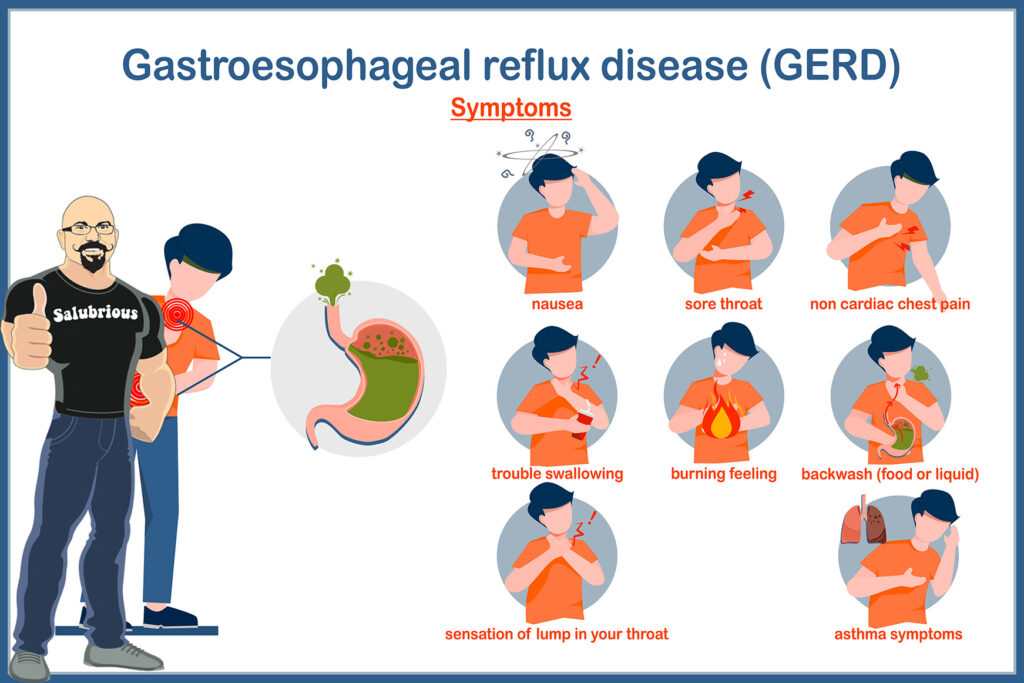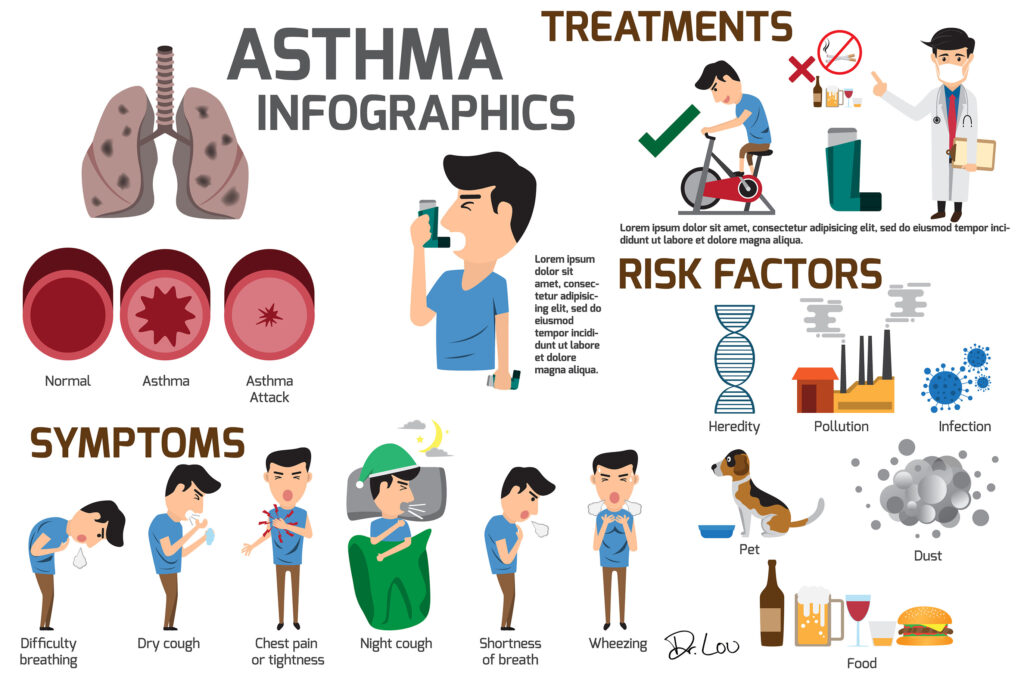The connection between asthma and heartburn (also known as acid reflux or gastr-oesophageal reflux disease – GERD) is complex and bidirectional. Here’s an overview of how these two conditions are linked:
What is the Prevalence and Correlation?
Yes, asthma and GERD frequently occur together. Studies show that between 30% to 80% of asthma patients also have GERD[3]. People with asthma are more likely to develop GERD compared to those without asthma[2].

asthma and gerd
How GERD Affects Asthma
There are two main ways that acid reflux can trigger or worsen asthma symptoms:
1. Nerve Reflex: Acid in the esophagus stimulates nerves connected to the lungs, making them more sensitive to asthma triggers[1][3]. This can cause the airways to narrow, leading to asthma symptoms. Chiropractic care has a positive effect on nerve function as well as chest expansion. It is very common for asthma sufferers to get some relief while under active chiropractic care.
2. Direct Aspiration: Small amounts of stomach acid can enter the airways directly, irritating them and causing inflammation, coughing, and wheezing[1][2].
GERD can often trigger asthma symptoms or make them worse, especially if:
– Asthma symptoms began in adulthood
– Symptoms worsen after meals, exercise, or when lying down
– Asthma medications seem less effective than usual[2]

asthma
How does asthma Affects GERD?
Asthma can also exacerbate GERD symptoms:
– Pressure changes in the chest during an asthma attack can cause the lower esophageal sphincter to relax, allowing stomach acid to flow back into the esophagus[2].
– Some asthma medications, particularly quick-relief inhalers like albuterol, can relax the esophageal muscles and potentially worsen GERD[3].
Treatment Considerations
Managing GERD often helps improve asthma symptoms. Treatment approaches may include:
- Lifestyle changes (e.g., avoiding trigger foods, not eating close to bedtime).
Fitness levels - Avoiding Medications like proton pump inhibitors or antacids is sometimes advised according to recent evidence that they may cause longterm harm.
- In some cases, surgical interventions[1][3]
- Chiropractors have a hiatal hernia protocol that has been shown to be quite effective. If the hiatal hernia is a causative factor for reflux symptoms, this technique may be of value. I, Dr. Lou, have used this technique with dozens of patients and all but a couple received very positive results.
It’s important for patients with both conditions to work closely with their healthcare providers to develop a comprehensive treatment plan that addresses both asthma and GERD symptoms.
The relationship between asthma and heartburn is complex and intertwined. Understanding this connection can lead to more effective management of both conditions and improved quality of life for patients dealing with these issues.
Dr. Lou is a chiropractor and acupuncture expert in Portland, Maine. He does not treat asthma or GERD, but he does have many tools that have helped his patients take fewer or no medications, get resolution or partial relief of symptoms, improve patient quality of life, and all without medications or surgeries. His Chinese medicine and supplement supply has long included herbal medicine for better breathing, inflammation, digestive health and the like. He may be reached at (207) SPINAL-1.
Citations:
[1] https://www.webmd.com/asthma/heartburn-asthma
[2] https://www.healthline.com/health/gerd/asthma
[3] https://allergyasthmanetwork.org/news/ask-the-allergist-how-gerd-affects-asthma/
[4] https://memorialhermann.org/services/conditions/reflux-related-adult-onset-asthma
[5] https://www.medicalnewstoday.com/articles/gerd-and-asthma
[6] https://www.mayoclinic.org/diseases-conditions/asthma/expert-answers/asthma-and-acid-reflux/faq-20057993
[7] https://www.verywellhealth.com/do-i-have-asthma-and-reflux-200882
[8] https://www.jacionline.org/article/S0091-6749(99)70360-X/fulltext
**MEDICAL DISCLAIMER**
All information, content, and material of this video or website is for informational and demonstration purposes only. It is not intended to serve as a substitute for the consultation, diagnosis, and/or medical treatment of a qualified physician or healthcare provider.
Don’t use this content as a replacement for treatment and advice given by your doctor or health care provider. Consult with your doctor or healthcare professional before doing anything contained in this content.
By watching this video, or using any of Dr. Lou’s content, you agree to indemnify and hold harmless Jacobs Chiropractic Acupuncture (and its representatives), Dr. Lou Jacobs for any and all losses, injuries, or damages resulting from any and all claims that arise from your use or misuse of this content. Jacobs Chiropractic Acupuncture and Dr. Lou Jacobs make no representations about the accuracy or suitability of this content.
USE OF THIS CONTENT IS AT YOUR OWN RISK.
